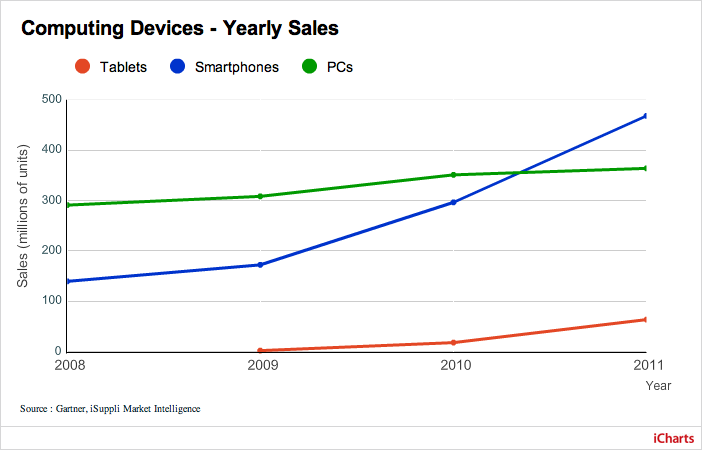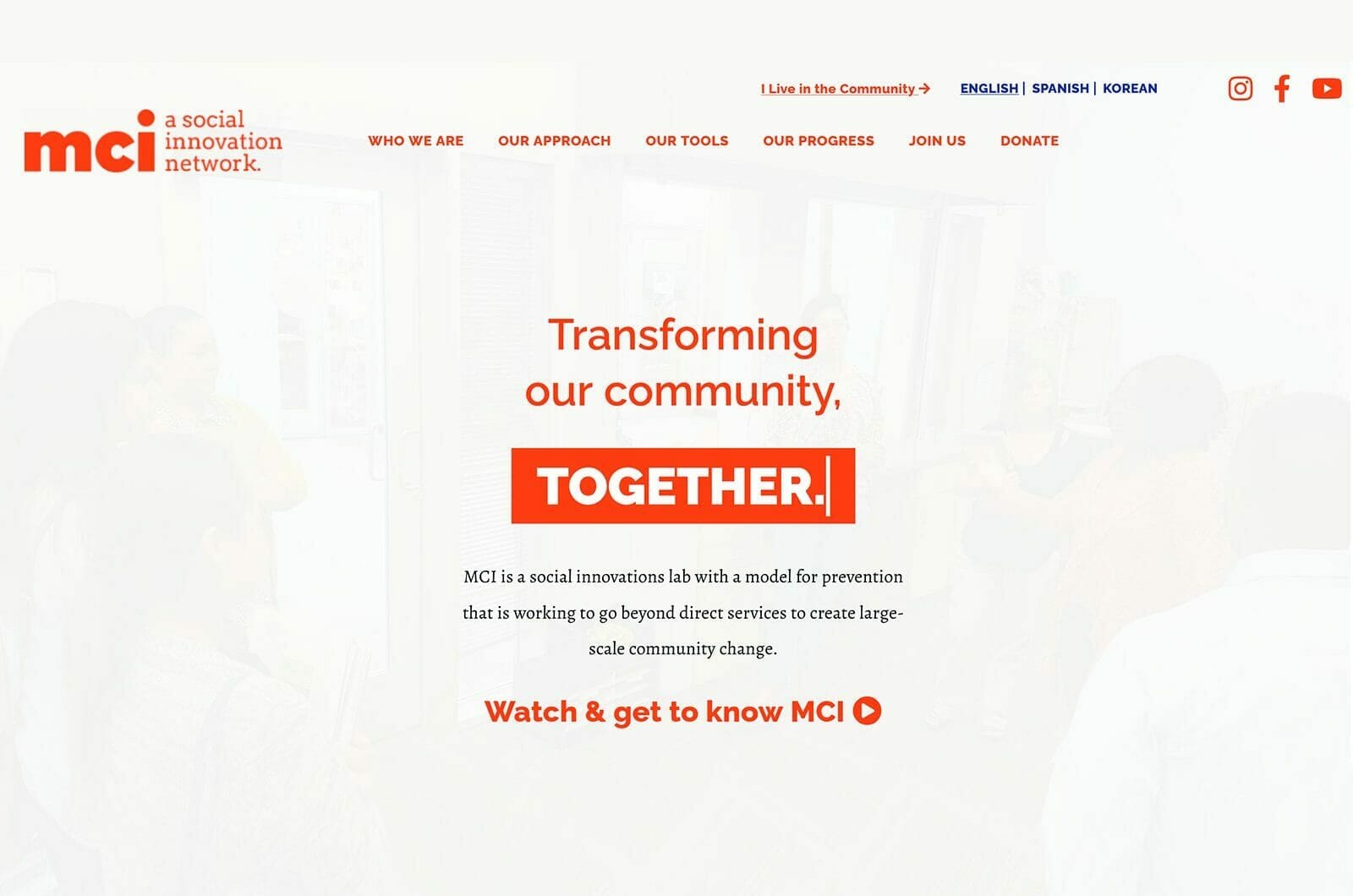20 Oct ‘12
Thoughts on the “Post-PC Era”
20 Oct ‘12
In: Technology, / By: Chris Simental
The term “Post-PC Era” is used a lot lately. It was coined by Apple in reference to the new era of computing where smartphones, tablets, eBook readers, gaming consoles, and interactive TVs are replacing many of the functions that PCs used to do exclusively. The term is sometimes misinterpreted, however, as implying that at some point everyone will use mobile devices instead of PCs and that PCs will no longer be made, bought, or used. I personally do not believe that is ever going to be the case; primarily because I believe PCs will always be needed if only to create mobile apps.
Definitions
I consider a PC to be a device that runs a full-fledged operating system and has enough horsepower to run applications designed for a desktop. Specifically, this includes desktop computers and laptops. I do not consider netbooks PCs because they typically have very low memory, limited disk space, and generally do not have the means to do any serious computing beyond web surfing and email.
A Mobile Device is a device that runs a mobile-based operating system and runs mobile-optimized apps, typically these are smartphones and tablets. These devices generally favor portability over functionality.
Mobile Device usage is rapidly increasing
One reason mobile devices get so much attention these days is because the rate of adoption is amazing. As the chart below depicts, sales of smarphones are beginning to surpass sales of PCs. And sales of tablets are on the rise as well.
Chart: Computing Devices – Yearly Sales
Powered By: iCharts | create, share, and embed interactive charts online
Some analysts estimate that by 2015 sales of tablets will be on par with sales of PCs. What’s interesting, though, is that PC sales are not diminishing, at least not now. In fact they are also still on the rise, just not as rapidly as mobile devices. The other thing to consider is that many of the sales of smartphones and tablets are to individuals who also own a PC and use it regularly, so in those cases the mobile device is an additional device, not a replacement device.
More stats about mobile:
- Heavy mobile data users are projected to triple to one billion by 2013. (source)
- Mobile internet adoption has outpaced desktop internet adoption by eight times. (source)
- Smartphone sales will surpass worldwide PC sales by the end of 2011 . (source)
- Over half of Android and iPhone users spend more than 30 minutes per day using mobile applications. (source)
But, Usefulness in Context Makes All the Difference
Any recently purchased PC is capable of doing anything that is needed in the realm of personal computing, but it’s hard to have it with you at all times, and that’s one reason why mobile devices are so compelling. But for me, the choice to use one device over another comes down to usefulness in context. When I’m at work, my desktop PC is more useful because it’s faster and has a larger screen than any of my mobile devices. When I’m on a business trip, my laptop is more useful because it’s moderately portable but still has the power I need to accomplish most work-related tasks. When I’m at a conference, however, my Android phone or iPad is more useful because they are ultra portable and handle most of the tasks I need to accomplish while on the go (namely web surfing and email).
Device Fatigue is for Real
Music engineers and producers use the term “Ear Fatigue” to identify the point at which their ears become tired from working in a session for extended periods of time. When their ears are fatigued, their work becomes harder and in some cases impossible. Because of this, engineers are very particular about the speakers they use. Better quality speakers equate to longer listening periods before fatigue sets in.
I’m starting to think about devices in terms of how quickly they personally tire me out. For example, I can work an 8+ hour day at my work computer before the device starts to wear me down. With my smartphone, on the other hand, within an hour of continuous use I’m ready to shut the thing down. I can usually work 3-4 hours straight on my laptop before I get tired of its track-pad and lack of full-sized keyboard. With a tablet, it may be 1-2 hours before I’m tired of messing with the onscreen keyboard. So, if I know I have more than a few hours of work to do, I’ll opt to do it at the office.
Where Mobile Devices Trump PCs
- Checking email: One definitely does not need a PC to check day-to-day email. I use a PC when I’m at my office desk–and I prefer it in that setting because reading and responding are faster than with a mobile device. However, when I’m on the go or at a meeting, my cell phone works almost as well for reading and responding to email–provided the email response does not need to be too detailed.
- Quick Internet searches: Mobile devices make it easy, and even fun, to search for things on the Internet. Think of how many times you’ve been at a dinner or out with friends and can’t think of a certain bit of trivia. Just pull out your phone or tablet and Bam, you’ve got the answer. Sure beats waiting until you get home to find the answer and then emailing everyone.
- Staying connected with networks: Mobile devices definitely win this category. Facebook, Twitter, and Foursquare would be a lot less useful–and a lot less used–if they could not be accessed while on the go. Having this “always on” access allows us to stay connected to our networks like never before.
- Taking and sharing photos: Until smartphones with built in cameras and apps came around, people had to work pretty hard to take and share photos with their friends. You had to have a digital camera, connect your camera to your PC, import the images, then upload the images. Now all you have to do is take the picture with your phone, select share and you’re done. This convenience has really changed the way people share photos and PCs will never be able to match that.
- Location aware contextual information: This is where mobile devices really shine. The fact that you can use a smartphone to find locations near you is just amazing. Before we had that, you’d need a printed map to find your way around. Or you’d need to talk to people, and who really wants to do that?
Where PCs Trump Mobile Devices
- Speed & Efficiency: Regardless of how fast and slick a mobile device is it will never be as fast or efficient as a PC. I’m not really talking about processor speed here because some mobile devices are very fast in that regard. I’m really talking about the form factor. For example, we type faster and more accurately on physical keyboards. Editing documents is also faster with a keyboard and a mouse. Short of connecting a keyboard, mouse, and larger screen to the mobile device, it will never be as fast or efficient to get work done.
- Screen space: Even with the highest resolution display you can find, a 10- or 11-inch tablet screen is just not going to fit as much work on it as a 22-inch monitor. Every inch of screen real estate lost equates to a significant drop in productivity.
- Ergonomics: Mobile devices can be great for reading a story or browsing the web where you can hold the device like a book. It’s comfortable and feels natural. But when you try to get some actual work done on a mobile device–including something as simple as drafting an email that’s longer than a few words–it becomes very hard to find a workable position. Multi-touch functionality can make it even worse because the device needs to be fully propped on something else.
- Productivity: I think all of the above culminate into the general topic of productivity. In this realm, PCs excel greatly over mobile devices. So much so that I believe mobile devices will never match the efficiency of PCs; thus never fully replacing them. There will perhaps be a time when there’s nothing than can be done on a PC that can’t be done on a mobile device, but the reality is, many tasks will still be much more efficient on a PC, hands down. Just think of trying to do the following on a mobile device: Write and edit a term paper; Build a website or mobile app; Do accounting; Complete a tax return. Sure you could do it, but if you had a choice, you’d probably prefer a PC.
The bottom line…
I use PCs, laptops, tablets, and smartphones on a regular basis. I have come to identify the best tasks for each device and tend to use each for the tasks it’s best suited. If for some reason I could only choose one device, at this point in my life it would be my laptop. The main reason for that is because I run a business and the work I do most is more efficiently done on a PC, and the laptop is the best balance of performance and portability. Now, when I’m retired and relaxing by the pool 24/7, I’d probably prefer to have a tablet because at that point I hope to just be checking email and looking at funny photos of cats.
















